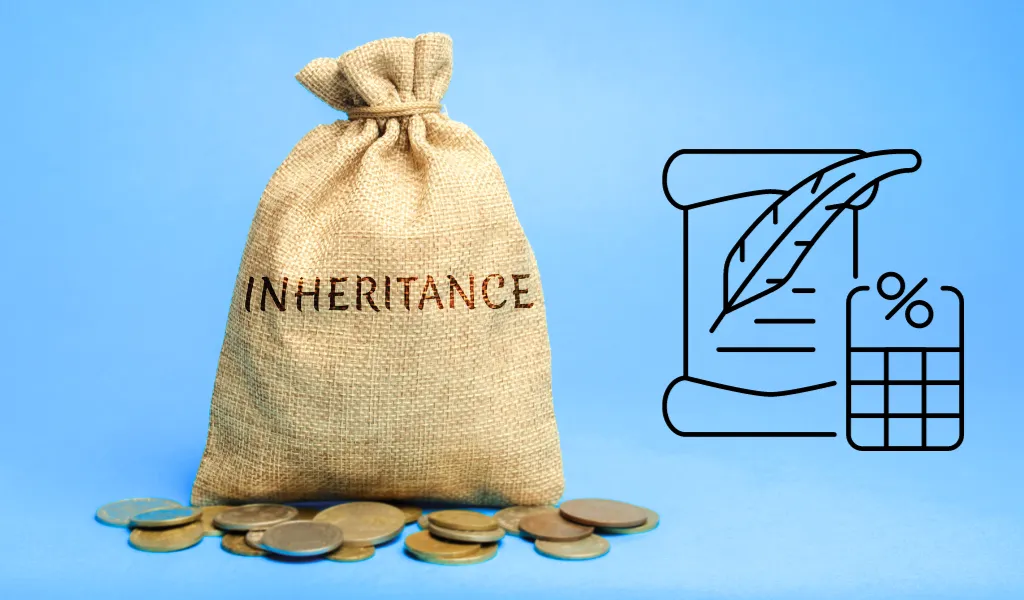People consider it a blessing when they receive an inheritance, but it is also a tremendous responsibility. Whether you receive a small inheritance or a substantial amount, it can drastically change your life. Usually, for the better. It is important to know how to manage it properly, so that you can benefit it from it fully. This guide will tell you what to do with inheritance money UK.
Before we move on to the list of things you can do with inheritance money, let’s discuss inheritance tax.
What is Inheritance Tax?
If a person passes away, then 40% inheritance tax is applicable to their assets. Also, 20% applies to specific transfers during their lifetime.
The value of the assets of the deceased, including mortgages and excluding debts, determines the amount of inheritance tax.
There are several ways to avoid or reduce inheritance tax. You can benefit from the tax-free allowance. Or during your lifetime, you can give away a certain amount of your money. This does not count towards your estate and is free of tax.

Inheritance Tax Rates and Thresholds in the UK for the Year 2023-24
For the 2023-24 tax year, everyone has a tax-free inheritance allowance of £325,000. This is called the nil-rate band. Since 2010-11, this allowance has not changed.
Anything in your estate that goes over the £325,000 threshold is subject to the standard inheritance tax rate. This is currently at 40%.
Here is an example to elaborate. You pass away and leave behind an estate that is worth £600,000. Your tax bill will stand at £110,000.
£600,000 – £325,000 = £275,000
40% of £275,000 = £110,000
Nevertheless, the situation is different if you are married or have a civil partner. In this case, you can leave more than this without paying tax. Then, do you know what to do with inheritance money UK?
What are the Other Tax Implications on Inheritance?
The distribution of the deceased’s estate occurs after paying off their debts and paying IHT.
Depending on what the heirs inherit, they can owe the following taxes:
Income Tax: If their inheritance generates a regular income, then they will owe income tax. For example, rent from a property or share dividends.
Capital Gains Tax: If the heirs sell their inheritance, they can end up owing capital gains tax. Suppose they inherit a property. Then, they sell it for an amount more than its value at the time of the owner’s passing. By selling this inherited property for profit, they will incur CGT. The amount of their CGT bill depends on their income tax rate band.

What to do with Inheritance Money UK
Now, let’s address the real question. What should you do with inheritance money? Although it may seem like a lifelong financial security, you need to plan for it carefully for long-term benefits. You need to consider your financial situation and use your inheritance money properly. Otherwise, you cannot reap its benefits fully.
Assess Financial Situation and Determine Financial Goals
You must evaluate your financial situation as of right now. Also, you should determine not only your short-term financial goals, but long-term as well.
Perhaps you want to purchase a house or pay off your debts. You may even want to save for retirement. Maybe you need funding for your education expenses.
To develop an efficient investment strategy, you need to comprehend your objectives. Thus, you need to understand what to do with inheritance money UK.
When evaluating your current financial situation, you should look at your income, existing investments, debts, and expenses. What is important to you depends on your age and stage of life. For example, if you are in your thirties, then you are likely looking to own a house. Whereas, if you are in your forties, then you are supporting your growing family. If you are in your fifties, then you are probably paying for driving lessons and university fees. Once you enter your sixties, you focus on supporting your income needs. You may even want to protect your wealth from inheritance tax.
Set Aside an Emergency Fund
It is important to set aside your inheritance money for an emergency fund before you invest it anywhere. This fund should hold three to six months of living expenses.
If you lose your job or face any unexpected expenses, then this acts as a financial safety net for you.
Moreover, if you want to reduce the chances of needing this emergency fund, you should evaluate your risk tolerance. Your risk tolerance is your ability to deal with market fluctuations and any potential investment losses. It is best to reach out to your financial adviser as they will guide help you with this assessment. Do you understand what to do with inheritance money UK?
Pay Off Your Debts
There is a link between your stage of life and the debts you owe. This can include a mortgage, other home loans, student loan, credit card debt, or any other amounts with high interest.
You can use a part of your interest to pay off any high-interest debts that you owe. By doing so, you can reduce interest payments and improve your financial situation. As compared to savings or lower risk investments, interest in debt is usually higher. Suppose you have outstanding credit card debt with a high-interest rate. Then, it does not make sense for you to open an ISA at a lower rate of, say, 4.5 pc.
Save and Invest Wisely
Once you pay off your debts, the next step you should take involves investing the inheritance for your future. You should not spend all of it on luxuries. Instead, think about investing wisely so that you grow your wealth. It is important to know what to do with inheritance money UK.
After you put away a substantial portion of your inheritance money in a savings account for rainy days, you should invest the rest. ISA is an excellent option for saving. The annual ISA allowance for the fiscal year is £20,000. Different forms of savings exist, such as stocks and shares ISA, cash ISA, or a mixture of these various types.
The smart move is to invest the inheritance money for long-term benefits. There are various financial instruments you can choose from. For example, bonds, commodities, stocks, foreign exchange, and real estate. When you invest your money with a solid investment strategy, you earn steady returns in the form of interest payments, rent, or dividends. However, these come with their own risks. To mitigate those risks, you can diversify across various industries, geographies, and securities.
Invest in Pension Funds
You can get tax benefits and returns through a pension. When you invest your inheritance money into pension funds, they become your safety net after your retirement. You can withdraw 25% as a lump sum free of tax.
Furthermore, this will pass on to your beneficiaries and heirs. The great news is that is not subject to inheritance tax. Therefore, it is an excellent way to invest your money and have a financially secure future.
Keep Yourself Informed
By reading this guide, you are taking the initial step to investing your inheritance money wisely.
You should educate yourself about market trends, investment strategies, and investment options that are available to you. This way, you can choose the right one for yourself.
Consequently, you can make informed decisions and accomplish more by comprehending the basics of investing. Also, you should contact a financial adviser. They will assess your personal situation, discuss your financial goals, and guide you through the available options. Therefore, you should know what to do with inheritance money UK.
Begin Investing Steadily and Maintain Patience
If you spend in haste, then you will end up repenting in leisure. There are plenty of valid reasons for you to take a steady approach instead of acting impulsively. This includes the attachment of sentimental reasons to your inheritance money.
Although it is difficult, but you should try not to decide based on what you think were the wishes of the benefactor.
With time, market conditions change. Moreover, your personal situation differs from their wants.
Therefore, instead of investing all your inheritance in one go, take the gradual route.
Regardless of the current market conditions, you must invest a regular and fixed amount. This will help mitigate the effects of market volatility. It is essential that you remain patient and do not act impulsively, as investing is a long-term endeavour. Do not base your decisions on short-term market fluctuations. Thus, you must understand what to do with inheritance money UK.
It is best to remain focused on your goals and approach to discipline.
Observe and Amend Your Investments
You must review your investment portfolio and adjust it accordingly on a regular basis. Unless, of course, you hire a financial adviser to handle all your savings and investments.
Over time, market conditions, along with your financial goals, can change. Therefore, you must remain up to date and modify your inheritance investments options appropriately.
Additionally, you need to make sure to add dates to the diary. This way, you can review your investment performance and make necessary adjustments.
Donate to Charity
Another option is donating a portion of your inheritance to charity. By doing so, you pass on the benefits you received through the inheritance to people who are less privileged. You can help those in need. The inheritance then serves as a means for others to benefit in addition to being a gift to you.
Personal Interests and Enjoyment
When you are fortunate enough to inherit a large sum of money, you can spend some of it on your own luxuries. Nevertheless, you should prioritise the investments, savings, and liabilities before you go on a shopping spree or book a flight.
After taking all the necessary steps, you can use the remaining money to go on a holiday, renovate your home, or anything else you have an interest in. You do not have to plan for your inheritance money on a very strict budget. You can use a portion of for your own bliss. Hence, it is essential to know what to do with inheritance money UK.
Get Expert Advice
Now that we have reached the end of the list, it is time for some much-needed expert advice. That’s right. You should hold a meeting with an investment professional or a financial adviser. They will evaluate your personal circumstance and offer you personalised guidance.
Moreover, they will assist you in developing a suitable investment strategy, choosing the right investments, and observing your portfolio regularly.

What are the Emotional Aspects of Dealing with Inheritance?
When dealing with inheritance, you are met with a complex mix of emotions. They can range from gratefulness and enthusiasm to guilt and worry. It is overwhelming to suddenly have responsibility for a significant amount of money. Not to mention that you receive it after the passing of a loved and dear one. There is a lot of pressure as you must make the right decisions and honour the wishes of the deceased. It is indeed a unique emotional landscape. It is an unfamiliar territory. Therefore, you must understand what to do with inheritance money UK.
Yes, you must invest your inheritance money wisely. However, you are going to face many emotional hurdles along the way. This is not simply about having a financial gain, but also about respecting the legacy of your family. You must comprehend the family dynamics. This includes navigating personal values and goals. If you want to make the most of your inheritance, then you should balance these emotional factors. You must make sure that is a positive force in your life and not a cause of conflict or stress. Do not overburden yourself with the emotional aspect of inheritance. Otherwise, you will not benefit from it fully.
Conclusion
To conclude, if you use your inheritance wisely, it is of great advantage to you. However, not everyone knows how to deal with such a significant amount of money. They end up wasting away their wealth as soon as they receive it. Later, they regret it. By then it is too late. Thus, the most crucial part of handling your inheritance is careful financial planning. Thus, you should know what to do with inheritance money UK.
The best route to take is to hire a financial advisor or financial planner. They will assist you in managing your inheritance. Moreover, they will offer you their unbiased opinion on your financial situation and provide you with personalised guidance.
They factor in your age, short-term and long-term obligations, risk tolerance, and your current financial status. Then, they determine the most appropriate avenues for investing your inheritance wisely. This way, you can navigate the complexities of financial planning for your inheritance. It will provide you with a safety net for the future. If you decide not to hire a financial advisor, then you can go for financial institutions. There are plenty of institutions that provide services according to your investor profile. They will match it with an investment portfolio that is best suited to your risk profile.
To conclude, as an Airbnb host, you may need to report your income. It is all dependent upon your circumstances and the amount of income you earn per year. If it crosses the specific threshold, then you must report it and pay tax. There is no need to stress, as you can reduce your tax liability with various methods. Furthermore, there are plenty of advantages to running an Airbnb business in the UK. It is ideal to reach out for expert advice before deciding to go down this road.








